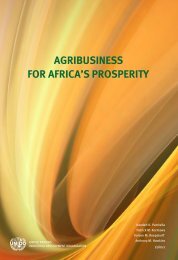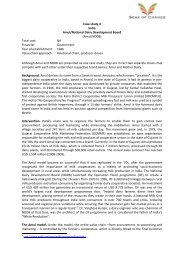Collection of Case Studies 2. - Seas of Change Initiative
Collection of Case Studies 2. - Seas of Change Initiative
Collection of Case Studies 2. - Seas of Change Initiative
Create successful ePaper yourself
Turn your PDF publications into a flip-book with our unique Google optimized e-Paper software.
« FACES, an Ecuadorian Foundation for Social and Community Support, has provided since 2008 credits andcapacity building workshops to small scale farmers.« MAGAP, the Ministry <strong>of</strong> Agriculture, Livestock, Aquaculture and Fishing, has been providing technical support,vaccinations and subsidies for farmers. Intercropping c<strong>of</strong>fee and plantain has showed to be so adequate thatright now, the Ecuadorian Government through the Agricultural Ministry is starting a 10 year program forrenovating 50.000 Ha <strong>of</strong> c<strong>of</strong>fee (both Arabica and Robusta) intercropped with plantain.« MAE, the Ministry <strong>of</strong> Environment, has been responsible for environmental monitoring and management <strong>of</strong> thearea, e.g. by granting forest exploitation rights and sanctioning infractions.« BNF, the National Bank <strong>of</strong> Public Works, has been <strong>of</strong>fering credits to farmers, as well as insurance and savingsservices. (Lopez and Choez, 2009)« GIZ (the current GTZ), who has (co-)financed the local collection and processing cen-tres for plantain bananas.« Regional Government (GPZCH), Zamora Chinchipe provincial government intended to strengthen issues <strong>of</strong> thebanana production chain, c<strong>of</strong>fee, cocoa and other agricultural chains« ACSUR: Spanish NGO who supports the chains <strong>of</strong> cacao, c<strong>of</strong>fee and plantain via the Re-gional GovernmentChain influencersMAGAP and a whole gamut <strong>of</strong> subsidiary bodies (including COFENAC), have issued general decrees and lawsregulating the agricultural sector. Producers <strong>of</strong> plantain obviously operate within this legal framework, but so farno specific legislation has been devoted to them. The same goes for all other ministries involved and theirsubsidiaries. Worth mentioning in this regard are the trade agreements with the USA and the EU, which lift tariffson bananas. Most farmers in the province <strong>of</strong> Zamora Chinchipe are not aware <strong>of</strong> the legal framework to whichthey are bound. Also, there is little to no representation <strong>of</strong> the plantain farmers in the legislative bodies, furtherwidening the gap between the two actors and causing farmers to lose out on opportunities in the legalframework. (Lopez and Choez, 2009)In Ecuador the intercropping system is traditional and never has been changed. In other regions (like Costa Ricafor example) there has been a promotion <strong>of</strong> mono-cropping <strong>of</strong> c<strong>of</strong>fee, in Ecuador this never took place, morebecause <strong>of</strong> lack <strong>of</strong> clear policies, but it is an important fact in the history <strong>of</strong> c<strong>of</strong>fee and plantain.61







